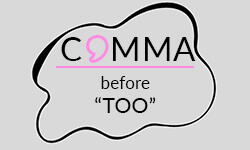
Commas can be a source of confusion for students, regularly resulting in errors in academic writing. This is because many are unaware of the exact rules and exceptions governing their usage. To clarify the specific rules and considerations surrounding the placement of commas before the adverb “too”, this article provides examples and explains the exceptions to the rules.
When to place a comma before “too”
In general, a comma before “too” is placed if the adverb is in the middle or at the very end of a sentence. When the word “too” is used as “also” or “in addition” a comma is typically not placed before the “too”.
Comma
In the middle of a sentence
At the end of a sentence
No comma
Used as “also”
Comma rules may vary depending on different style guides. Additionally, complexly structured sentences may have exceptions for comma placement. Consider readability without commas.
Comma before “too”
When the “too” is placed in the middle or at the end of a sentence, a comma has to be placed before the adverb. This is to separate the word from the rest of the sentence to emphasize it.
“Too” in the middle of a sentence
A comma before “too” is placed in the middle of a sentence to emphasize it and heighten the readability. This way the word follows the same rule as adverbial phrases. So, you put a comma before as well as after “too” when it interrupts the logical flow of the sentence.
“Too” at the end of a sentence
A comma before “too” is placed when it appears at the end of a sentence. This is also done to emphasize the adverb. Reading the sentence out loud to see whether you pause naturally may be helpful.
No comma before “too”
Generally, there is no comma placed before “too” if the adverb is used like “also” or “in addition” in a sentence. A comma before “too” rarely needs to be placed. However, the writer can decide whether there should be an emphasis on a certain word which would indicate the use of a comma.
Used as “also”
When the adverb “too” means “in addition” or “also” in the sentence, a comma is typically not placed before it. Here are examples to illustrate this.
Test yourself!
Practice sheet
Test your understanding of using commas before “too” by correctly placing them in 10 sentences. Check your answers in the second tab.
- I went to the shop and bought milk too.
- She likes both chocolate and vanilla ice cream too.
- He wants to come too if there’s room in the car.
- We walked to the park, and we played football too.
- I enjoy playing tennis too, just like my sister.
- They went to the beach, and they went swimming too.
- He wants to study maths, and he wants to study physics too.
- She sings beautifully too, just like her mother.
- They both like to hike and bike too.
- I can’t wait to see you again too!
- I went to the shop and bought milk too. (No comma)
- She likes both chocolate and vanilla ice cream too. (No comma)
- He wants to come too if there’s room in the car. (No comma)
- We walked to the park, and we played football, too. (Comma)
- I enjoy playing tennis, too, just like my sister. (Comma)
- They went to the beach, and they went swimming, too. (Comma)
- He wants to study maths, and he wants to study physics, too. (Comma)
- She sings beautifully, too, just like her mother. (Comma)
- They both like to hike and bike too. (No comma)
- I can’t wait to see you again, too! (Comma)
- ✓ 3D live preview of your individual configuration
- ✓ Free express delivery for every single purchase
- ✓ Top-notch bindings with customised embossing

FAQs
No, the writer can decide whether they want to emphasize the adverb “too” or not. If yes, then a comma is placed before “too”.
The reason for placing a comma before “too” at the end of a sentence is a matter of style and emphasis. Note that different style guides may have varying recommendations for usage.
The APA Style Guide does not specifically mandate the use or omission of a comma before “too” in a sentence. The use of a comma before “too” is often a matter of stylistic preference rather than a strict grammatical rule. In general, in English usage, the comma can be used for clarity or emphasis but is not strictly necessary.
According to the Chicago Manual, a comma before “too” is only necessary when emphasizing an abrupt change of thought.
